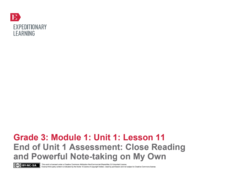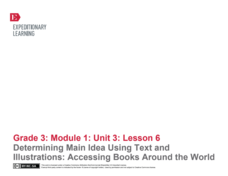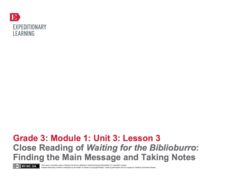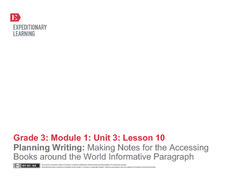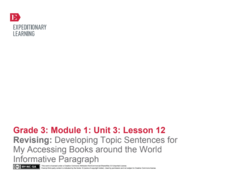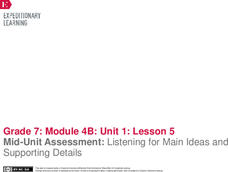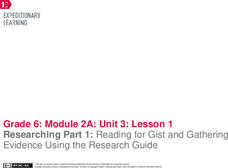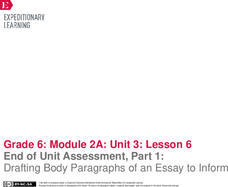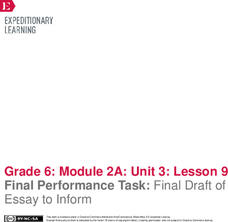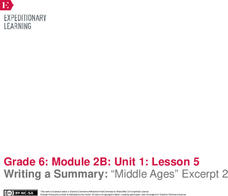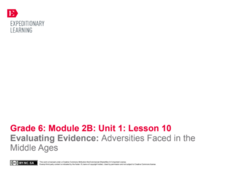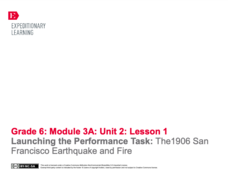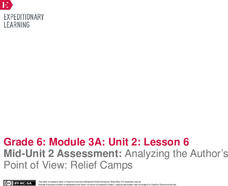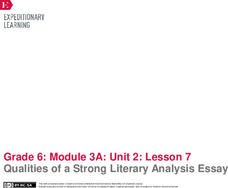EngageNY
End of Unit 1 Assessment: Close Reading and Powerful Note-Taking on My Own
As the final lesson plan in a larger beginning-of-the-year unit to establish routines and teach close reading skills, this plan is designed as an assessment piece. Using the story, The Librarian of Basra, learners independently complete...
EngageNY
Close Reading of The Boy Who Loved Words: How Do People Build Their Word Power?
Third graders practice the skills of identifying the main message in a story, describing the main character, and sorting the key details of a story into specific categories. The story they read is, The Boy Who Loved Words. Using a...
EngageNY
Vocabulary: Finding the Meaning of Words in Context in The Boy Who Loved Words
Here is a lesson plan that invites learners to engage in a kinesthetic activity that allows them to physically move and manipulate words in order to think about ways to understand vocabulary in context. After that activity is complete,...
EngageNY
Determining Main Idea Using Text and Illustrations: Accessing Books Around the World
Ease into informational text with the lesson suggested here. Part of a unit series, the lesson draws from previous lessons and acts as a natural moment to add in informational text. Class members read one section of My Librarian is a...
EngageNY
Close Reading of Waiting for the Biblioburro: Finding the Main Message and Taking Notes
Expose your class to Waiting for the Biblioburro, narrative nonfiction that will act as the bridge between ficiton and informational texts to come. Class members do a close reading of the text, looking at excerpts instead of the whole...
EngageNY
Planning Writing: Making Notes for the Accessing Books Around the World Informative Paragraph
Encourage your young writers to thoughtfully plan and organize their work. First, model how this is done and vocalize your thought process as you work. Next, create a class list of strategies that they can use during independent writing...
EngageNY
Close Reading of Excerpts from My Librarian Is a Camel: How Do People Access Books Around the World?
Acquaint your class with informational text through a close reading. First, examine a couple of pages together, looking at text features and content. The whole class focuses on marking down a brief summary of each paragraph before...
EngageNY
Revising: Developing Topic Sentences for My Accessing Books Around the World Informative Paragraph
Revision is an important part of the writing process. Focus on revising topic sentences and details with the plan described here. This is part of a unit, so pupils have already filled out a graphic organizer about traveling libraries...
EngageNY
Writing a First Draft: Accessing Books Around the World Informative Paragraph
Supervise the final drafting of a well-organized paragraph by following the steps outlined in this plan. Using the included sample paragraph as a model, class members brainstorm criteria for quality work and then compose their paragraphs...
EngageNY
Illustrating: Geography Icon
For the final step of the performance task for this unit, class members will create an illustration to go with the paragraph on their bookmark. After looking at models, guide pupils toward recognizing the criteria for an effective...
EngageNY
Editing and Publishing: Accessing Books Around the World Informative Paragraph
Provide time to polish paragraphs in class. Pupils, who have been working on these informational pieces for several days now, will have a chance to check for spelling and grammar before publishing their work. Sure to be a rewarding final...
EngageNY
Mid-Unit Assessment: Listening for Main Ideas and Supporting Details
Pay attention! Scholars view the video"Why College Students Should Start Paying Attention to Water" multiple times to complete a note catcher. After discussing their thoughts with the class, learners watch "The Water Crisis Isn’t...
EngageNY
Analyzing Main Ideas and Details: Why Care about Water?
Pay attention to details! After completing text-dependent questions about paragraphs 10-12 of "Water is Life," scholars view the video "Why Care about Water. "They view the video three times and use a Main Idea and Details note-catcher...
EngageNY
Clarifying Thinking on Water Management: Revisiting the Gallery Walk
One, two, three, go! Scholars gather in triads and number themselves one to three. Each number is responsible for sharing a section of the map homework completed the night before as learners discuss domain-specific vocabulary terms using...
EngageNY
End of Unit Assessment: Tracing and Evaluating Arguments
Give water the attention it deserves. Scholars watch Corporations Need to Pay More Attention to Water and respond to questions as part of their end of the unit assessment. They then complete the assessment by reading and responding to...
EngageNY
Researching Part 1: Reading for Gist and Gathering Evidence Using the Research Guide
If only life came with an owner's manual. Pupils assemble with their research teams to discuss which of Steve Jobs' rules to live by most resonates with them. Scholars also read informational texts in pursuit of finding the gist and...
EngageNY
Analyzing the Structure and Content of an Essay to Inform
Outlines are a great asset to essay planning. Scholars read and analyze a model essay about the importance of daily reading and consider how it would look in an outline format. Next, they outline their own informative essays about rules...
EngageNY
End of Unit Assessment, Part 1: Drafting Body Paragraphs of an Essay to Inform
Anybody can write a body paragraph! Pupils analyze the development of ideas in a body paragraph from a model essay. Next, using what they've learned, they draft the body paragraphs of their My Rule to Live By informative essay.
EngageNY
Final Performance Task: Final Draft of Essay to Inform
Sometimes, it's fun to follow the rules. Using their drafts of an evidence-based essay from previous lessons, scholars write their final informative essays about rules to live by. Next, they choose and share quotes from their essays that...
EngageNY
Writing a Summary: “Middle Ages” Excerpt 2
What is the big idea? Scholars use Middle Ages Excerpt 2 to complete a summary graphic organizer. They then use the information from the organizer to write a summary of the text on lined paper. Learners share summaries with the class.
EngageNY
Evaluating Evidence: Adversities Faced in the Middle Ages
How is that relevant? Scholars gain an understanding of the words relevant and compelling. They then go back to the End of Unit 1 Assessment Prompt: Adversity in the Middle Ages and look at the second bullet that pertains to relevant and...
EngageNY
Launching the Performance Task: The1906 San Francisco Earthquake and Fire
Picture that! Pupils view photographs of the aftermath of the 1906 San Francisco earthquake and fire, discussing what they know and wonder about each image. Then, scholars watch a short video about the historic event and complete a KWL...
EngageNY
Mid-Unit 2 Assessment: Analyzing the Author’s Point of View: Relief Camps
We're halfway there ... what a relief! Scholars read an excerpt from a primary source about the relief camps associated with the1906 San Francisco earthquake. Next, they complete a mid-unit assessment, answering short-answer and...
EngageNY
Qualities of a Strong Literary Analysis Essay
Read like a writer. Scholars read a model literary analysis in preparation for a similar writing assignment before annotating each paragraph for the gist. Next, pupils devise a list of qualities of a strong literary analysis essay.


